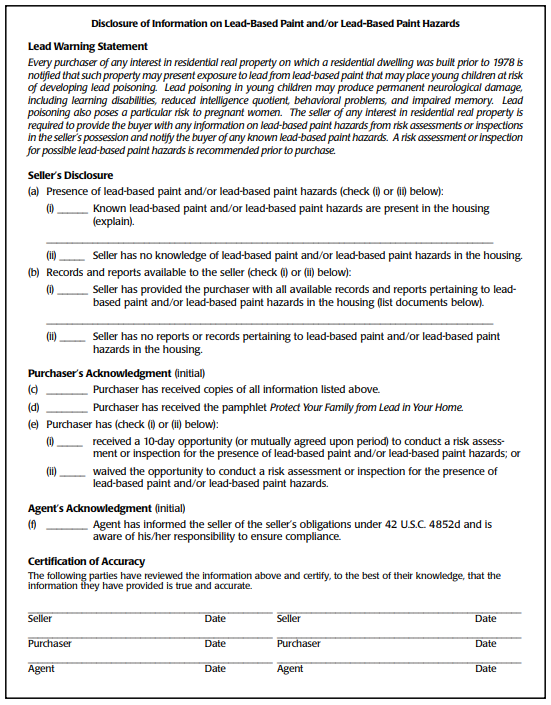✏️ Editor’s Note: Realtor Associations, agents, and MLS’ have started implementing changes related to the NAR’s $418 million settlement. While home-sellers will likely save thousands in commission, compliance and litigation risks have significantly increased for sellers throughout the nation. Learn how NAR’s settlement affects home sellers.
Every state and county has its own laws on real estate disclosures and statutes resolution to different issues. As always the case, in Colorado law, the has seller disclosure requirements for both residential and commercial transactions to disclose property material defects. Moreover, you must know a few of the major details about selling a Colorado property to avoid making harsh decisions and mistakes.
Furthermore, in Colorado, it is crucial for sellers to disclose whether their property is located in a special taxing district or is part of a common interest. These are property details that could affect the property’s value and thus must be disclosed properly.
» How To Sell My House Colorado: Know the process to sell your home in Colorado.
Here are all the seller disclosure requirements in Colorado you need to know:
- Federal Disclosure of Information on Lead-Based Paint and/or Lead-Based Paint Hazards
- Standard Seller’s Property Disclosure Form
- Green Disclosure Form
» How Do I Sell My House As Is Colorado: Here is Houzeo’s guide on how to sell your home as-is in Colorado.
Residential Lead-Based Paint Hazard Reduction

The Residential Lead-Based Paint Hazard Reduction Act passed in 1992 requires the disclosure of any lead-based paint or chipped paint in any housing built prior to 1978.
The Lead-Based Paint Disclosure Form is one of the most important federal disclosure requirements in Colorado. The form contains details on lead paint in the property or any harmful hazardous materials.
It’s also the seller’s responsibility to provide reading materials or pamphlets that should notify the buyer from the harmful effects of lead-based hazards and attachments on the Lead Warning Statement. The seller should also have shown the buyer a certification or document that confirms the completion of the seller’s real estate requirements.
The seller grants the buyer a 10-day period to conduct a risk assessment or paint inspection for lead-based paint hazards. For a reliable inspection, the homebuyers may look for a lead hazard inspection firm by following this link.
» How To Sell My House Faster Colorado: Read our blog if you’re in dire need to sell your house fast in Colorado.
Standard Seller’s Property Disclosure Form
Colorado’s DORA-approved contract mandates sellers to disclose based on their “current actual knowledge.” Remember, your role, as a seller, is to comply with the disclosure requirements in Colorado as best as you can
However, to ensure the seller has disclosed relevant information required by laws, the Colorado Real Estate Commission has provided a Standard Disclosure Form that sellers should fill out honestly. The disclosure form and a professional home inspection can help identify fixable issues before listing. Further, a home inspection can be helpful and save you a lot of trouble from failing a deal.
Here are the disclosure requirements in Colorado details you are obliged to state.
Structural Conditions
Structural problems, property damage due to insects, termites, rodents, etc. Also, damages caused by hail, fire, wind, flood, or another casualty. Further, exterior wall or window problems, moisture and water problems, and Exterior Artificial Stucco (EIFS).
Roof and Any Ceiling Issues
Generally roof leak, roof damage, gutter or downspout problems, Skylight issues, and other roof problems and details.
Appliances
Evidently issues with appliances: dryer, dishwasher, disposal, hood, grill, microwave, range, refrigerator, washer, freezer, antenna, compactor, satellite.
Electrical and Telecommunications
Meanwhile the problems given below:
- Security System
- Switches and outlets
- Light fixtures
- Electrical Service
- Inside Telephone wiring
- Landscape lighting
- Aluminum wiring
- Garage door controls
Mechanical
You also need to notify the buyer for any problems on the Elevator, Entry gate system, and also the Overhead doors.
Ventilation, Air, Heat
However, any existing issues on the Window units, Vent Fans, Humidifier, Air purifier, Fireplace, Heating stove, Fuel Tanks, Air Conditioning, Heating system, Evaporative cooler, and House fan. You also need to include details like the type and fuel used for heating system, fireplace, and heating stove—and the date when it was owned or replaced, including the Radiant Heating System.
Water
Answer “Yes” if you have problems regarding:
- Water heater/filter system
- Water softener
- Well
- Sauna
- Water system pump
- Hot tub or spa
- Pool
- Underground sprinkler system
- Fire sprinkler system
- Backflow prevention device
- Irrigation dump
- Irrigation system
- Steam room/shower
Other information like the fuel type, capacity, and date of the last inspection, leased, or owned must also be included.
Source of Water and Water Supply
Provide details about the type of water supply and the water provider.
Sewer
Presently the type of sanitary sewer service, type of septic system, and the date of latest individual use permit issued, of latest inspection, and latest pumping.
Flooding and Drainage
Drainage and Retention Ponds
Other Disclosures—Improvements
Moreover, any other property issues that are not mentioned in the standard disclosure form.
Use, Zoning, and Legal Issues
Particularly zoning violation, variance, conditional use, a notice of the threat of condemnation proceedings, notice of any adverse conditions from any governmental, notice of zoning action related to the Property, Building code or city or county violations, violations of restrictive covenants or owners’ association rules or regulations, any additions or alterations made, building improvements or constructed within the past one year from this date, and any other legal action.
Access and Parking
When there is access issues, roads, trails, pathways or driveways through the property real estate by others, any proposed or existing transportation project, public highway or county road bordering the property. Unlike encroachments, boundary disputes or unrecorded easements, requirements for curb, landscaping, and is there any share or common areas with adjoining properties.
Environmental Conditions
As a seller, you also need to report any problems regarding Hazardous materials on the property, like radioactive, biohazardous materials, asbestos, toxic, pesticides, herbicides, wastewater sludge, radon, methane, mill tailings, solvents, or petroleum products. Included also are the Underground storage tanks, Aboveground storage tanks, Underground transmission lines, Animals kept in the residence, Property used as a dump, landfill, or municipal solid waste landfill, diseased or infested trees, or shrubs, and other issues concerning the environment.
Common Interest Community—Association Property
Sellers also need to disclose if the property is part of an owners’ association, and special assessments or increases in regular assessments approved by owners’ association but not yet implemented. Moreover, any demand or commenced lawsuit against a builder or contractor alleging defective construction of improvements of the Association Property, and issues in the Common Elements or Limited Common Elements of the Association Property.
Other General Disclosures
However, any existing problems, written reports of any building, site, roofing, soils, or engineering investigations, any property insurance claim submitted, structural, architectural, and engineering plans. Matters like if the property was recently used as a methamphetamine laboratory, any government special improvements approved but not yet installed, and any pending litigation or other dispute resolution proceedings regarding the Property.
» Can I Sell My Home By Myself Colorado: Are you considering selling your house without a realtor? Here are our tips for a smooth selling process.
The Green Disclosure Form
Also as a response to climate change, the Colorado state has implemented a form of demand for home sellers. It’s a serious global issue that needs to be addressed, not only by the private sector but also by the state and local governments. Presently that’s why the Colorado state has taken dire action to make properties “green” and disclose any energy-saving issues about the property.
However if the seller has completed the form, it’s highly recommended that the buyer should still inspect the property or hire an expert inspector to examine the property thoroughly to confirm the property’s condition mentioned.
As approved by the Colorado Real Estate Commission (GD31-9-12), the Green Disclosure form has to be done. The said disclosure form contains matters such as:
- Home Performance Programs (with ENERGY STAR)
- Construction Type
- Heating, Cooling, and Ventilation
- Water Efficient Features
- Indoor Air Quality
- Sustainable Materials
- Energy Features
- Appliances (ENERGY STAR)
What if the seller fails to disclose any of this information to the buyer?
Significantly failure to comply with the standard disclosure form can put your transaction at high risk. This means this could turn your sale into null and void, and possibly, face legal trouble for hiding property defects—a breach of contract or fraud. The seller would be held responsible for the costs associated with all the nondisclosure depending on the disclosure laws of the state. Furthermore, the buyer could also take legal action and can face you in litigation for misleading information about your property.
Also as a responsible seller, it’s your primary duty to examine and review the form properly. You can contact your real estate agent and attorney to check if all the details are correct. If you have a question, don’t ever hesitate to ask your agent before it’s too late to mend minor mistakes. Make sure you disclose with honesty and “good faith” to complete the disclosure requirements in Colorado in no time.
Note: All the information mentioned above is just a guide for real estate sellers in Colorado. It is still best to seek expert legal advice if you have any clarifications.
Tips to Minimize Issues in Colorado Disclosure Documents
| Review And Verify | There’s a time allowance (some permit 10 days) to review and verify everything about your Purchase and Sales Agreement—including the square footage, home usage, and marketing. |
| Ask Questions | Ask questions when in doubt. This would help you in avoiding future troubles. |
| Hire A Professional Inspector | A professional inspector can help you gather backup information about the property’s condition. You can also opt for a pre-inspection before listing. » Find out the best home inspectors in Colorado. |
| Disclose Everything | To avoid problems in your home disclosure statement, disclose everything you know honestly. Even though it’s a minor issue, you must disclose it. |
| Get A Licensed Agent Involved | The best way to avoid disclosure issues is to get a licensed real estate agent in Colorado. Agents can help you manage and assist you in the process along the way. |
Colorado Seller’s Disclosures are a little complicated. Selling your house FSBO is usually good, but then you would have to deal with all the disclosures on your own. However, this demands that you be aware of all the disclosure requirements and that any mistake can cost you dearly. Houzeo can help you with this.
- ✍️ Editor’s Note: Though selling your home yourself on a For Sale By Owner website can save you thousands in commission, we highly recommend you add a Flat Fee MLS listing to your marketing strategy. Check out the best Colorado Flat Fee MLS.
» CO Flat Fee MLS – Discover The Best Flat Fee MLS Service in Colorado
Final Word
Though listing your property with Houzeo, you get access to all forms in electronic format. And that too, for FREE! Houzeo has segregated all the disclosures state-wise so that you don’t have to hunt for Colorado seller disclosures separately.
Check out some of the Houzeo reviews and how it has helped customers around the US.









.webp)
